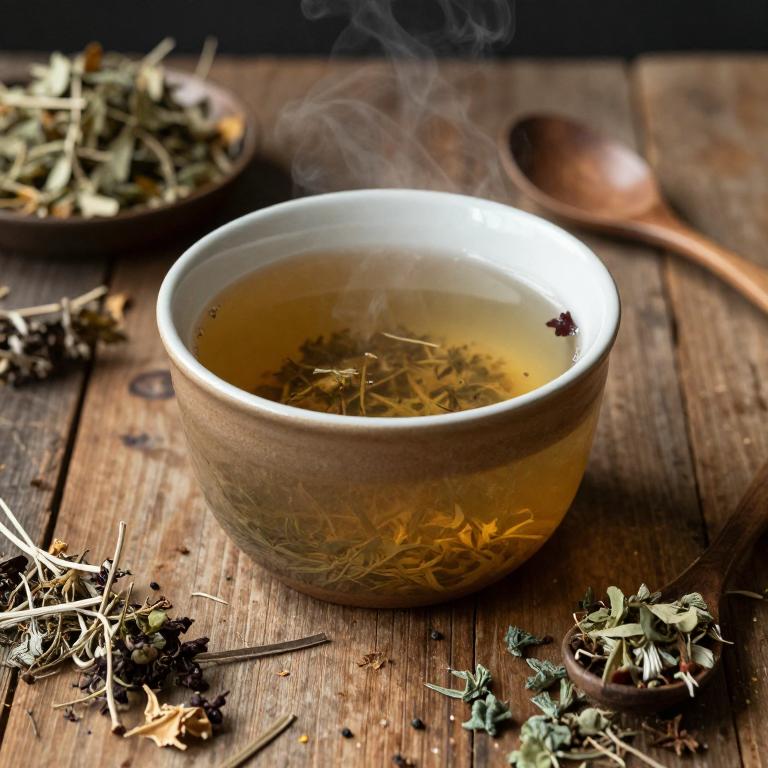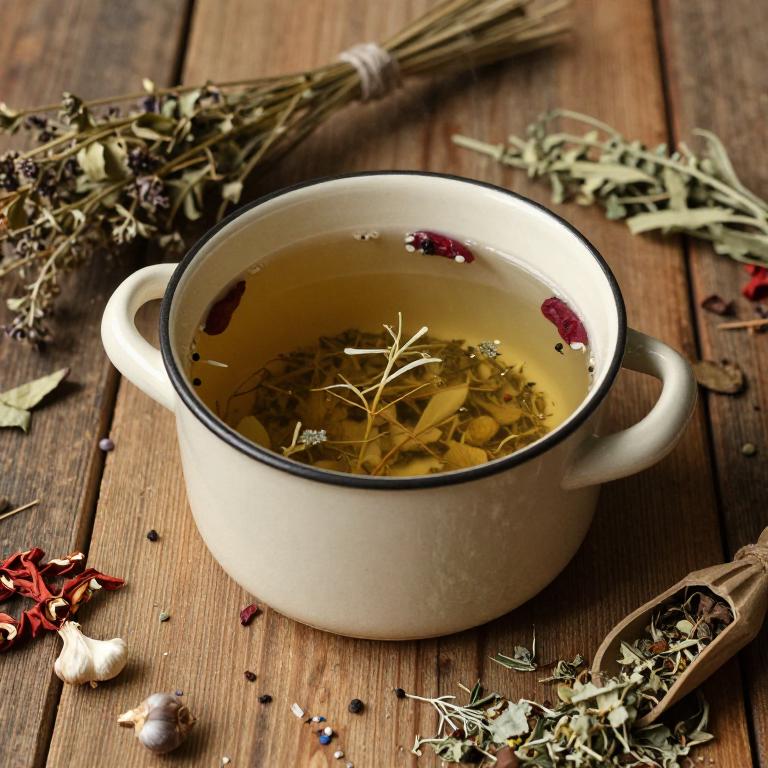10 Best Herbal Decoctions For Wheezing

Herbal decoctions for wheezing are traditional remedies that utilize specific combinations of herbs to alleviate respiratory symptoms such as bronchial constriction and coughing.
Commonly used herbs include licorice root, which has anti-inflammatory properties, and ephedra, known for its bronchodilating effects, though its use is often regulated due to potential side effects. These decoctions are typically prepared by simmering the herbs in water for an extended period to extract their active compounds. They are often recommended for individuals with asthma or chronic obstructive pulmonary disease (COPD) as complementary therapy.
However, it is important to consult a healthcare professional before using herbal decoctions, as they can interact with medications and may not be suitable for everyone.
Table of Contents
- 1. Thyme (Thymus vulgaris)
- 2. Eucalyptus (Eucalyptus globulus)
- 3. Peppermint (Mentha piperita)
- 4. Licorice (Glycyrrhiza glabra)
- 5. Salvia (Salvia officinalis)
- 6. Ginger (Zingiber officinale)
- 7. Black pepper (Piper nigrum)
- 8. Fennel (Foeniculum vulgare)
- 9. Chamomile (Matricaria chamomilla)
- 10. Rosemary (Rosmarinus officinalis)
1. Thyme (Thymus vulgaris)

Thymus vulgaris, commonly known as thyme, has been traditionally used in herbal medicine for its potential respiratory benefits, including the relief of wheezing.
The essential oils and volatile compounds in thyme, such as thymol and carvacrol, possess antimicrobial and anti-inflammatory properties that may help reduce airway inflammation and mucus production. Herbal decoctions made from thyme leaves are often prepared by simmering the dried herb in water, allowing the active compounds to be extracted for consumption. These decoctions are believed to support bronchial health and ease breathing in individuals experiencing wheezing symptoms.
While thyme is generally considered safe, it is advisable to consult a healthcare professional before using it as a treatment, especially for chronic respiratory conditions.
2. Eucalyptus (Eucalyptus globulus)

Eucalyptus globulus, commonly known as the Tasmanian blue gum, is widely used in herbal medicine for its respiratory benefits.
Herbal decoctions made from the leaves of this plant are often employed to alleviate symptoms of wheezing due to their expectorant and bronchodilating properties. The active compounds, such as eucalyptol and cineole, help to loosen mucus and reduce airway inflammation, making breathing easier. These decoctions are typically prepared by simmering the dried leaves in water for several minutes, and they can be consumed as a tea or used in steam inhalation.
While generally considered safe, it is advisable to consult a healthcare professional before using eucalyptus globulus for persistent or severe wheezing.
3. Peppermint (Mentha piperita)

Mentha piperita, commonly known as peppermint, has been traditionally used in herbal medicine for its potential to alleviate respiratory symptoms, including wheezing.
Peppermint herbal decoctions are prepared by steeping the dried leaves in hot water, creating a soothing and aromatic infusion. The active compounds in peppermint, such as menthol and menthone, may help to relax bronchial muscles and reduce airway inflammation, thereby easing wheezing. While some studies suggest that peppermint may provide mild relief for mild respiratory conditions, it is not a substitute for medical treatment in cases of severe or persistent wheezing.
As with any herbal remedy, it is advisable to consult a healthcare professional before using peppermint decoctions, especially for individuals with underlying health conditions or those taking other medications.
4. Licorice (Glycyrrhiza glabra)

Glycyrrhiza glabra, commonly known as licorice, has been traditionally used in herbal medicine for its potential therapeutic effects on respiratory conditions, including wheezing.
The root of this plant contains various bioactive compounds such as glycyrrhizin, flavonoids, and saponins, which may help reduce inflammation and relax airway muscles. Herbal decoctions made from Glycyrrhiza glabra are often prepared by boiling the dried root in water to extract its active components. These decoctions are believed to support bronchodilation and may alleviate symptoms associated with asthma and other respiratory ailments.
However, long-term use of licorice decoctions should be monitored due to potential side effects such as hypertension and electrolyte imbalances.
5. Salvia (Salvia officinalis)

Salvia officinalis, commonly known as sage, has been traditionally used in herbal medicine for its potential respiratory benefits, including alleviating symptoms of wheezing.
Herbal decoctions made from dried sage leaves are prepared by simmering the plant material in water to extract its active compounds, such as rosmarinic acid and flavonoids. These compounds are believed to possess anti-inflammatory and bronchodilatory properties, which may help reduce airway inflammation and ease breathing in individuals experiencing wheezing. While some studies suggest sage may support respiratory health, more clinical research is needed to confirm its efficacy for specific conditions like asthma or chronic obstructive pulmonary disease.
As with any herbal remedy, it is important to consult a healthcare professional before using sage decoctions, especially for those with preexisting medical conditions or taking medications.
6. Ginger (Zingiber officinale)

Zingiber officinale, commonly known as ginger, has been traditionally used in herbal medicine to alleviate symptoms of wheezing due to its anti-inflammatory and bronchodilatory properties.
Ginger contains bioactive compounds such as gingerol and shogaol, which help reduce airway inflammation and relax bronchial muscles, thereby easing breathing difficulties. Herbal decoctions made from fresh or dried ginger root can be prepared by boiling the root in water for several minutes, allowing the active compounds to infuse into the liquid. These decoctions are often consumed warm to soothe the respiratory tract and provide relief from coughing and shortness of breath.
While ginger is generally safe for most people, it is advisable to consult a healthcare professional before using it as a treatment for wheezing, especially in individuals with underlying health conditions.
7. Black pepper (Piper nigrum)

Piper nigrum, commonly known as black pepper, has been traditionally used in herbal medicine for its potential respiratory benefits.
Herbal decoctions made from black pepper are believed to help alleviate symptoms of wheezing by promoting bronchodilation and reducing inflammation in the airways. The active compound, piperine, may enhance the effects of other respiratory treatments by increasing the absorption of certain nutrients and compounds. These decoctions are often prepared by simmering the dried peppercorns in water for an extended period to extract their therapeutic properties.
While some preliminary studies suggest possible benefits, more clinical research is needed to fully understand the efficacy and safety of piper nigrum in treating wheezing.
8. Fennel (Foeniculum vulgare)

Foeniculum vulgare, commonly known as fennel, has been traditionally used in herbal medicine to alleviate symptoms of wheezing due to its expectorant and anti-inflammatory properties.
A decoction of fennel seeds or leaves can help soothe irritated airways and reduce bronchial spasms, making it beneficial for individuals suffering from respiratory conditions such as asthma or bronchitis. To prepare the decoction, dried fennel seeds are typically simmered in water for about 15 to 20 minutes, then strained and consumed warm. This herbal remedy is often recommended as a complementary therapy to support respiratory health, though it should not replace prescribed medical treatments.
While generally safe, individuals with allergies to the carrot family should exercise caution when using fennel-based decoctions.
9. Chamomile (Matricaria chamomilla)

Matricaria chamomilla, commonly known as chamomile, has been traditionally used in herbal medicine to address respiratory issues, including wheezing.
Its calming and anti-inflammatory properties are believed to help reduce bronchial spasms and ease breathing difficulties. Chamomile herbal decoctions can be prepared by steeping dried flowers in hot water, creating a soothing tea that may be consumed several times a day. The essential oil of chamomile, often used in steam inhalations, may further enhance its effectiveness in alleviating respiratory congestion.
However, while some individuals find relief from chamomile, it is important to consult a healthcare professional before using it for persistent or severe wheezing, as it may not be suitable for everyone.
10. Rosemary (Rosmarinus officinalis)

Rosmarinus officinalis, commonly known as rosemary, has been traditionally used in herbal medicine for its potential respiratory benefits.
Herbal decoctions made from rosemary leaves are believed to help alleviate wheezing by promoting bronchodilation and reducing inflammation in the airways. These decoctions typically involve simmering fresh or dried rosemary in water to extract its essential oils and active compounds, such as rosmarinic acid and cineole. The aromatic compounds in rosemary may help soothe the respiratory tract and ease breathing in individuals experiencing wheezing.
However, while some studies suggest possible benefits, it is important to consult a healthcare professional before using rosemary decoctions as a treatment for respiratory conditions.